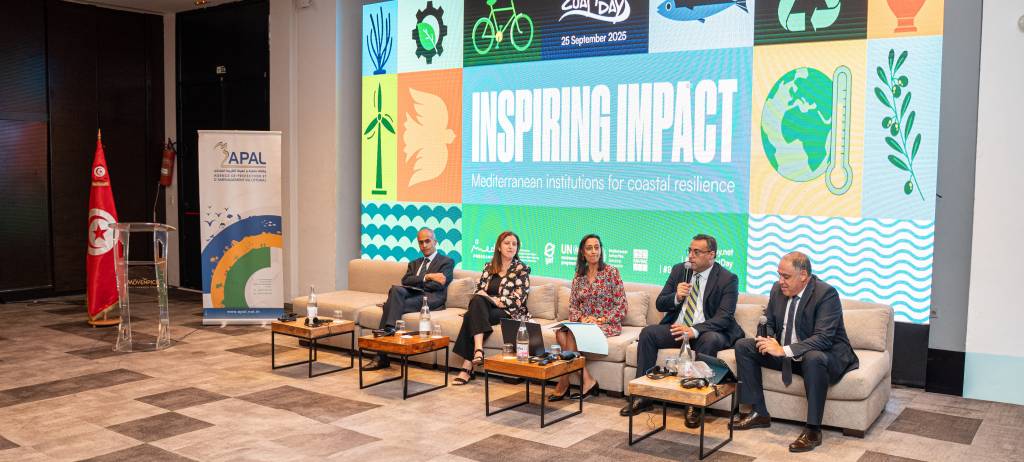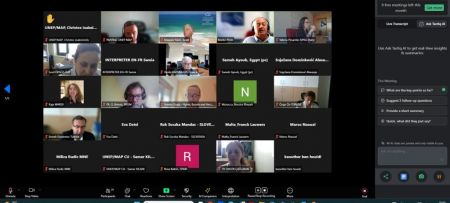Fifty years after the Barcelona Convention was signed, the urgency of protecting the Mediterranean’s fragile shores has only grown. This year’s Coast Day carried a simple message: institutions matter most when they inspire real impact on the ground.
Launched in 2007, Mediterranean Coast Day has become more than a date on the calendar. It is a spark that opens conversations and builds bridges - between governance and communities, science and storytelling, policies and the people most affected by them - reminding us of the sea that binds us, and the coasts that sustain our lives.
In 2025, the celebrations were framed by the campaign “Inspiring Impact: Mediterranean institutions for coastal resilience.” As PAP/RAC Director Daria Povh Škugor wrote in her editorial, “Institutions are not abstract. They’re made of people, and they exist to serve people. We all have a role to play in supporting them, and in holding them to account too. Coastal resilience is stronger when communities and institutions work hand in hand in mutual trust and cooperation.”
That idea – that policies must connect with people – gave Coast Day its meaning this year. From a high-level gathering in Tunisia, to regional voices captured in a digital StoryMap, to the Coast Day week in Slovenia under the EUSAIR framework and communities celebrating heritage with environmental protection in Sardinia, the Mediterranean showed that it is strongest when it acts together.
Tunisia takes the lead
On 25 September, Gammarth in Tunisia became the stage for the central Coast Day celebration, bringing together more than 170 participants under the lead of the Agence de Protection et d’Aménagement du Littoral (APAL), UNEP/MAP and PAP/RAC.
Framed by the theme “Behind every thriving coastline are people and institutions working tirelessly to protect it,” the event blended high-level debate with concrete solutions. Keynotes stressed the urgency of cooperation, while two panel discussions explored the roles of international and national institutions in managing coasts.
“Only by working together can we protect the Mediterranean for the generations to come. We must keep dialogue open with businesses, universities, civil society, and the coastal communities themselves,” said Tatjana Hema, Coordinator of UNEP/MAP. She emphasised that while institutions are preparing with risk maps, nature-based solutions, and new planning tools, “without citizen involvement, adaptation will not succeed.”
Coast Day 2025 made that point tangible : strong institutions - local to global - can unite to protect coasts and shape a sustainable future. In Tunisia, one of the region's erosion hotspots, the Coastal Protection and Planning Agency (APAL) has taken bold steps to protect and regenerate the coastline, working in close partnership with 96 municipalities from Bizerte to Djerba. Communities are restoring dunes, safeguarding fishing grounds, and transforming fragile stretches of shoreline into shared spaces of resilience. For Mehdi Ben Haj, APAL’s Director General, “local voices don’t just echo - they steer the ship.”
This spirit was captured in the video about the new zonal management tool for Lella Hadhria (Djerba), funded under the GEF MedProgramme’s Child Project 2.1, which offered a glimpse of integrated governance in practice. The day also featured an exhibition on marine biodiversity, showcasing research and local initiatives under the ORIENTATE Tunis project.
With strong media coverage and lively exchanges, the event closed on a clear call to action: “Coastal protection is a shared responsibility between institutions, researchers, civil society, and citizens.”
Institutions in action – a digital campaign
Beyond the events on the ground, Coast Day 2025 also played out online. A region-wide social media campaign culminated in the launch of the StoryMap “Institutions in action: Strengthening coastal resilience – Stories of collaboration, innovation, and impact across the Mediterranean.”
The collection shone a light on ministries, municipalities, NGOs, research centres, the private sector and regional networks - institutions and organisations active in making a difference across the Mediterranean, despite the challenges they face along the way.
From Cyprus came a commitment to action. “Securing the ratification of the ICZM Protocol is at the top of both the Department’s and the Ministry’s agendas,” said Yiota Lazarou, Environmental Officer at the Department of Environment and PAP/RAC National Focal Point. In Montenegro, Minister Damjan Ćulafić warned - “Our coastline is the first line of defence against climate change. We must protect it through sustainable management, reduced pressures, and the preservation of natural resources.”
Science added its voice too. The MedECC network underlined that governance is the backbone of coastal resilience. Without shared structures and coordination, individual efforts risk losing their impact.”
Other stories showed how institutions are working on the ground. In Turkiye, new policies are being translated into local action through integrated coastal management. France’s Conservatoire du Littoral drew on decades of experience in protecting fragile shorelines through land acquisition and stewardship – an approach increasingly seen as a model across the region.
In Algeria, whose National School of Marine Sciences and Coastal Management (ENSSMAL) is featured in the StoryMap, the message reached prime-time audiences. Samir Bachouche, WestMED National Hub, told viewers on national television: “The Mediterranean coast is our shared heritage, and safeguarding it requires a collective effort from all countries.”
Woven together, these stories carried a strong message: When knowledge is shared, solutions multiply. And when institutions are trusted, citizens step forward. That is what inspiring impact looks like.
Local action in Slovenia and Sardinia
For more than a decade, Izola has hosted Mediterranean Coast Week, connecting science, policy, economy and community voices around shared challenges and opportunities. This year, PAP/RAC took part in the “Climate Resilience: from Source to Sea” workshop, showing how it integrates climate resilience into coastal management planning.
Slovenia, the first country to ratify the ICZM Protocol in 2009 - a milestone now celebrated each year as Mediterranean Coast Day - shows how 46 km of coastline can be a model for the entire region – from establishing new protected areas to transforming a coastal road into a park for people and wildlife. Read the full story here
In Cagliari, Coast Day coincided with the Sardinia Sailing Cup, where children from Up School Cagliari explored the coastal ecosystem and built an installation with recycled materials. On stage, a spotlight was cast on Mediterranean coastal challenges and the EU 30×30 strategy, with Capo Carbonara MPA and RAS Ambiente presenting how projects like BLUE4ALL are contributing to these goals.
A shared vision
Mediterranean coasts remain among the most climate-vulnerable in the world. Rising seas, erosion and biodiversity loss demand urgent and collective responses. As the Coast Day campaign reminded us: Coasts won’t become resilient on their own. It takes all of us – institutions, businesses, and citizens – working together to plan, protect, and act.
Looking ahead, this shared vision will guide discussions at the upcoming 24th Meeting of the Contracting Parties to the Barcelona Convention (COP24).
Because when the Mediterranean acts together, positive change is possible.


